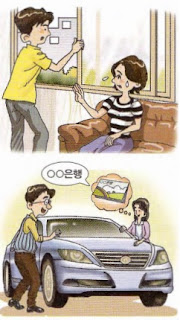 가: 창문을 닫을까요?
가: 창문을 닫을까요?
Shall I close the window?
나: 아니요, 더우니까 그냥 열어 두세요.
No, you can just leave it open because it’s hot.
가: 자동차를 어떻게 샀어요?
How did you manage to buy a car?
나: 그동안 은행에 저축해 둔 돈으로 샀어요.
I bought it with the money I had been saving in the bank.
This expression refers to the continuation of a particular state of being following the completion of an action. Thus it is similar in meaning to the grammar ‘-아/어 놓다’ only verbs can come before this expression.

• 서랍 안에 중요한 것이 많아서 항상 잠가 둡니다.
There are a lot of important things in the drawer, so I always keep it locked.
• 동창들의 전화번호를 적어 둔 수첩을 잃어버렸어요.
I lost my pocketbook in which I had written down the phone numbers of my schoolmates.
• 치를 세워 둔 곳이 어디예요?
Where did you park the car?
1. This expression is used to indicate either doing an action in advance to prepare for some other event or action or the fact that something is already in such a state.
• 오늘은 일정이 많아서 점심 먹을 시간이 없을지도 몰라요. 미리 밥을 먹어 두려고 해요.
Today, I have a lot to do, so I might not have time to eat lunch. I plan to eat lunch early (in advance).
• 발표할 때 실수하지 않으려면 연습을 많이 해 두세요.
If you don’t want to make any mistakes when giving your presentation, then practice a lot in advance.
2. The expression -아/어 두다 is used in almost the same way as -아/어 놓다 and therefore in many cases the two expressions can be used interchangeably. However, compared with -아/어 놓다,-아/어 두다 is more often used to indicate that a relatively long time has passed since a particular state of being came about. Thus, -아/어 두다 is used more often in cases describing the storage or saving of something.
• 여기는 조선 시대 물건을 보관해 두는 곳입니다.
This is where we store items from the Joseon Dynasty,
• 마늘을 냉장고에 얼려 두고 필요할 때마다 꺼내 써요
(I) freeze (and keep) garlic in the freezer to be used when necessary.
>> You can click on the title of each grammar below to learn about the other grammar which also expresses ‘Situational States of Being’:
01 -아/어 놓다
02 -아/어 두다
03 -(으)ㄴ 채로
04 -(으)ㄴ/는 대로
>> Full of Intermediate grammar: Click here
